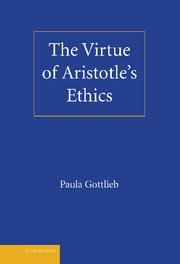Book contents
- Frontmatter
- Contents
- Preface and Acknowledgments
- Abbreviations
- Introduction
- PART I ETHICAL VIRTUE
- PART II ETHICAL REASONING
- 6 Moral Dilemmas
- 7 Fine Motivation
- 8 The Practical Syllogism
- 9 What the Good Person Has to Know
- 10 A Polis for Aristotle's Virtues
- Conclusion
- Appendix: Uniting the “Large-scale” Virtues
- Select Bibliography
- Index
10 - A Polis for Aristotle's Virtues
Published online by Cambridge University Press: 29 September 2009
- Frontmatter
- Contents
- Preface and Acknowledgments
- Abbreviations
- Introduction
- PART I ETHICAL VIRTUE
- PART II ETHICAL REASONING
- 6 Moral Dilemmas
- 7 Fine Motivation
- 8 The Practical Syllogism
- 9 What the Good Person Has to Know
- 10 A Polis for Aristotle's Virtues
- Conclusion
- Appendix: Uniting the “Large-scale” Virtues
- Select Bibliography
- Index
Summary
Aristotle's Nicomachean Ethics starts and ends with political concerns. At the beginning of his work, Aristotle says that the inquiry he is about to begin is a “sort of politics”; and at the end of the work, he suggests that the reader should complete the study of the humanities by studying different political systems. According to Aristotle, the political or social setting is crucial for the virtue and happiness of the citizens. In this chapter, then, I turn to the Politics, but my discussion, both of the polis and of Aristotelian happiness, is everywhere informed by the discussion of Aristotle's ethic of virtue that preceded it.
In previous chapters, I have argued that Aristotle's ethic of virtue is not susceptible to Millian or Kantian interpretations. In this chapter, I argue that Aristotle's view is also antithetical to the social contract tradition of ethics, most notably exemplified by Hobbes. To that end, I explain why the polis is needed and why it is natural, according to Aristotle, and how the genesis and justification for the polis stems from Aristotle's objective view of the good for human beings. I also argue that Aristotle's account of the polis presupposes the non-remedial view of the virtues, as presented in Chapter 3 and explored in subsequent chapters.
I then consider the type of happiness that the polis aims at, according to Aristotle, and the point of the apparent ranking of two types of happiness in the final book of the Nicomachean Ethics.
- Type
- Chapter
- Information
- The Virtue of Aristotle's Ethics , pp. 191 - 207Publisher: Cambridge University PressPrint publication year: 2009



